unit 1(浙江省丽水地区龙泉市)
文档属性
| 名称 | unit 1(浙江省丽水地区龙泉市) |
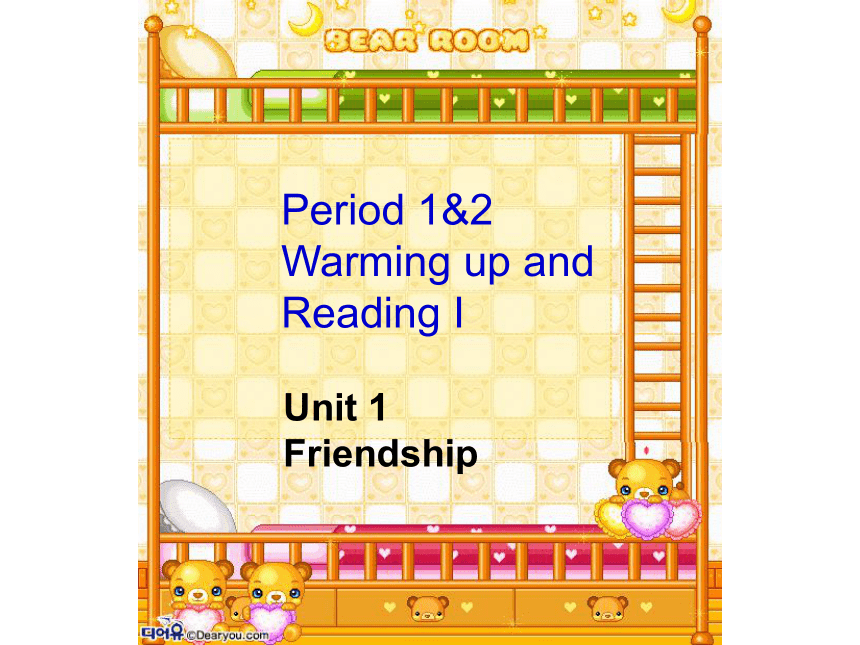
|
|
| 格式 | rar | ||
| 文件大小 | 1.6MB | ||
| 资源类型 | 教案 | ||
| 版本资源 | 人教版(新课程标准) | ||
| 科目 | 英语 | ||
| 更新时间 | 2007-09-17 00:00:00 | ||
图片预览

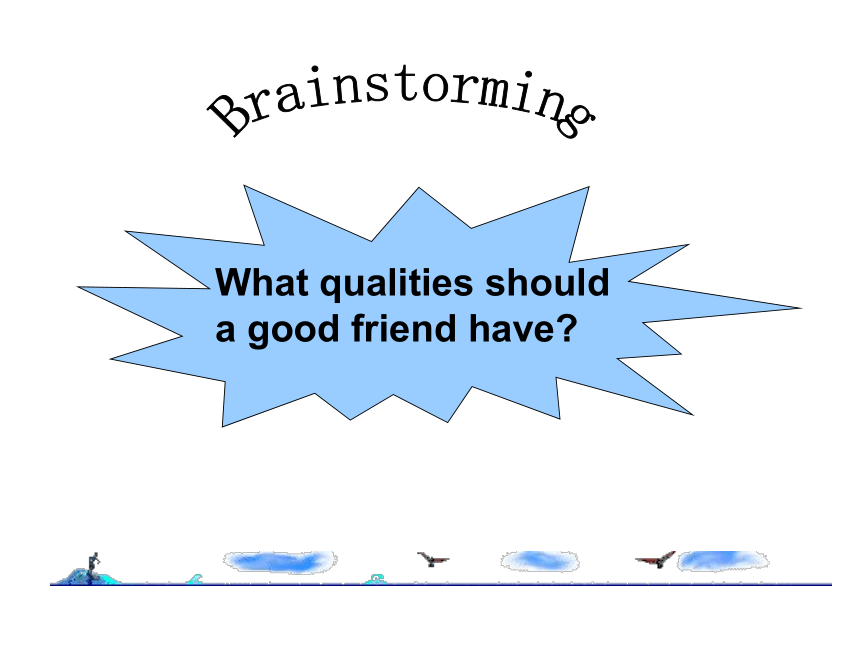
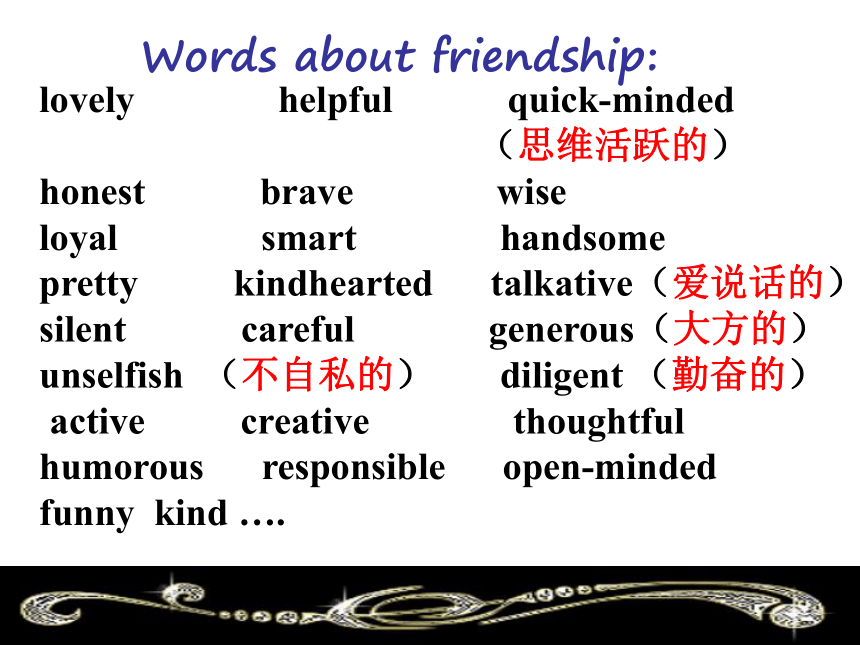
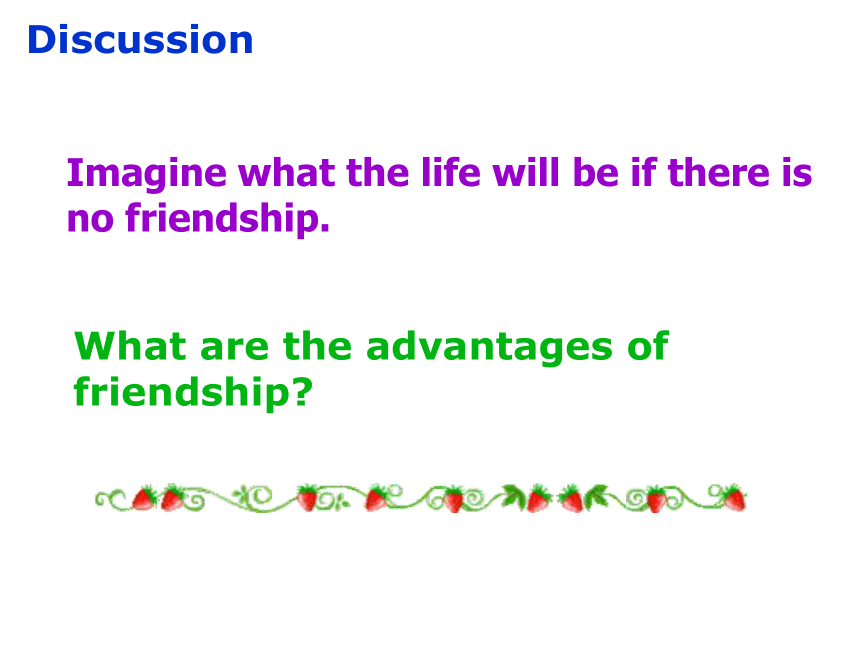



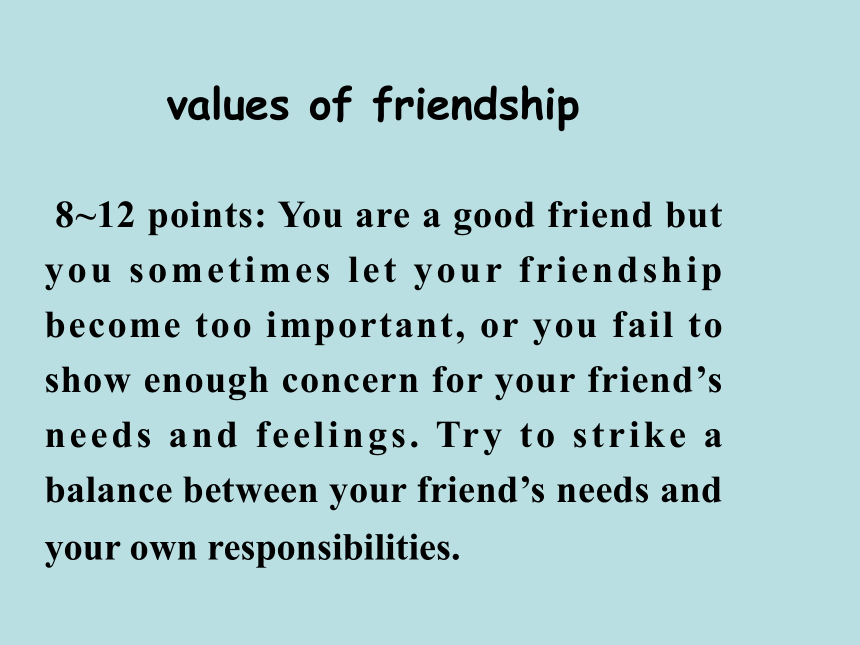
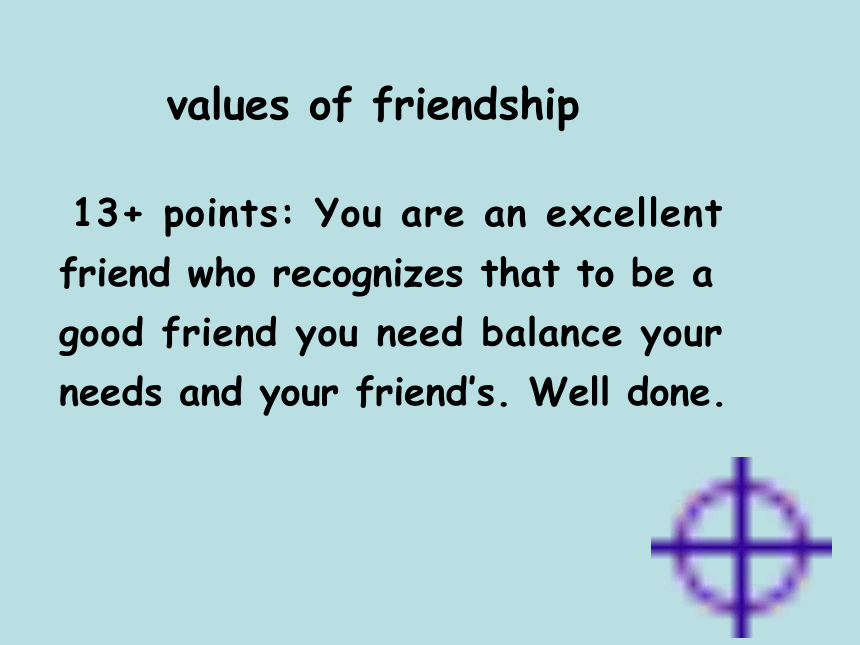
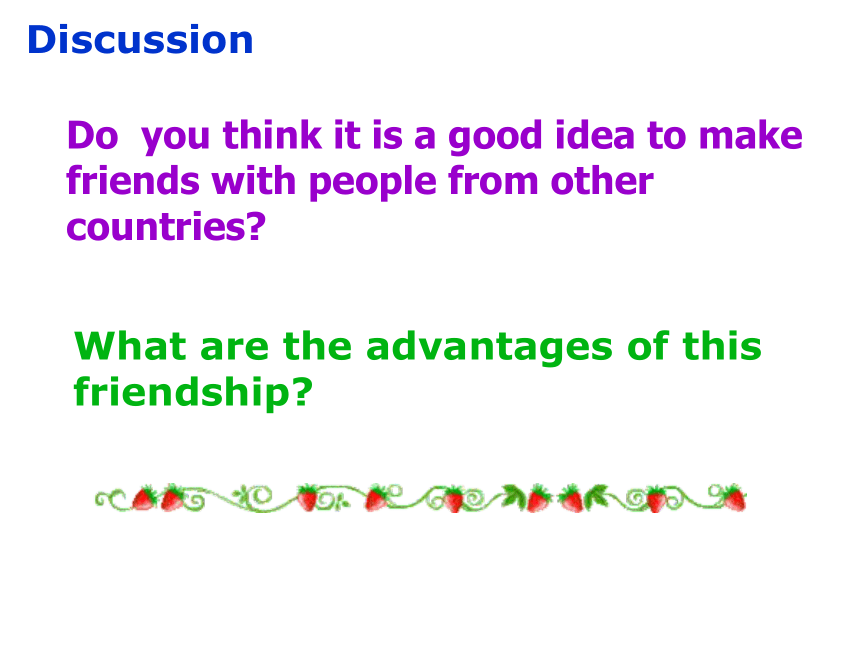
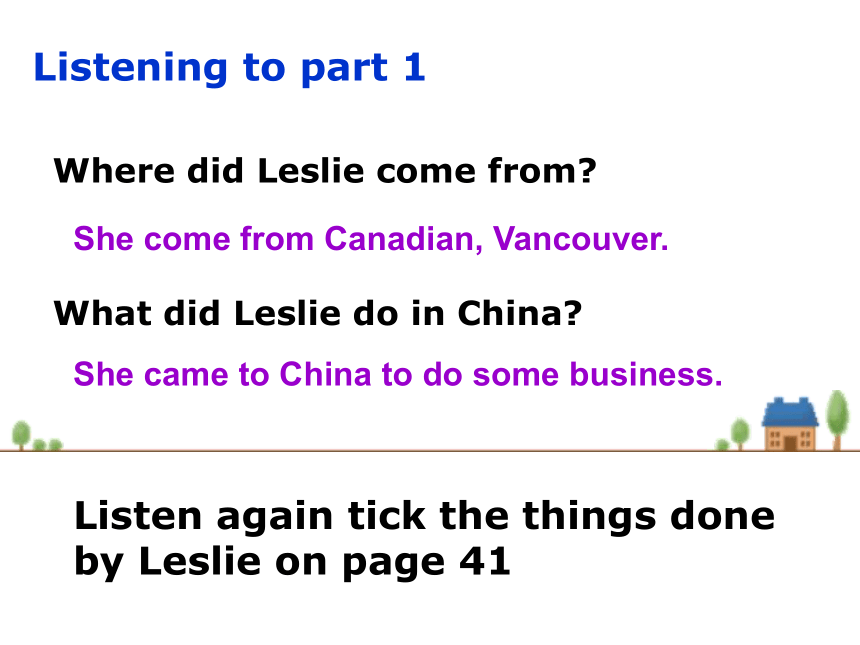
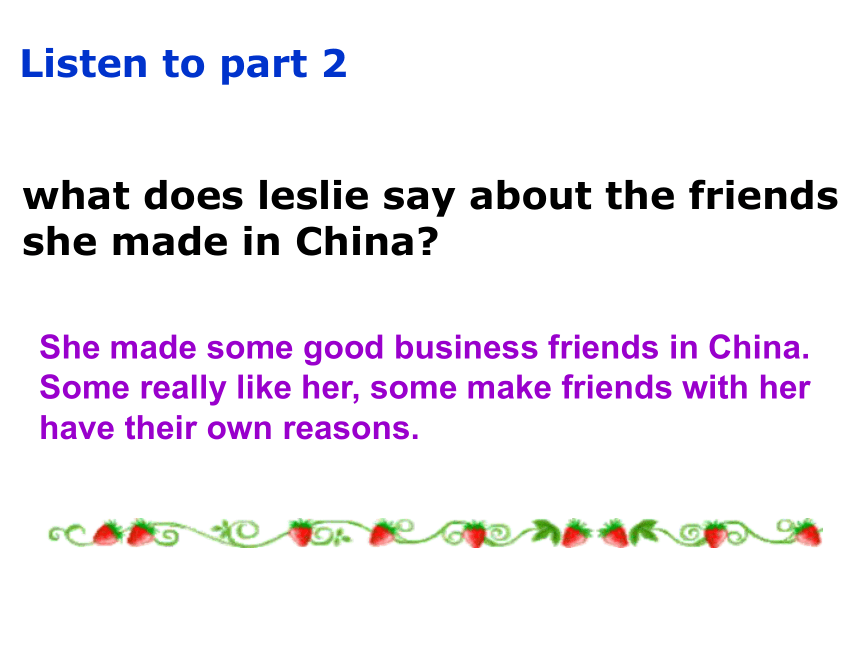
文档简介
课件104张PPT。Period 1&2 Warming up and Reading IUnit 1 FriendshipWhat qualities should a good friend have?
BrainstormingWords about friendship:lovely helpful quick-minded
(思维活跃的)
honest brave wise
loyal smart handsome
pretty kindhearted talkative(爱说话的)
silent careful generous(大方的)
unselfish (不自私的) diligent (勤奋的)
active creative thoughtful
humorous responsible open-minded
funny kind …. Imagine what the life will be if there is no friendship.What are the advantages of friendship?DiscussionFriendship Quotes: Friendship is the golden ribbon that ties the world together.
------- Kristina Kentigian
Friends are the sunshine of life.
------- John Hay
A friend in need is a friend indeed.
You can buy friendship with friendship,
but never with dollars.
---- unknown
A life without a friend is a life without a sun.
---- French proverb
Friends are like wine; the older, the better.?4~7 points: You are not a good friend. You either neglect your friend’s needs or just do what he/she wants you to do. You should think more about what a good friend needs to do.values of friendship ?8~12 points: You are a good friend but you sometimes let your friendship become too important, or you fail to show enough concern for your friend’s needs and feelings. Try to strike a balance between your friend’s needs and your own responsibilities. values of friendship ?13+ points: You are an excellent friend who recognizes that to be a good friend you need balance your needs and your friend’s. Well done.values of friendship Do you think it is a good idea to make friends with people from other countries?What are the advantages of this friendship?DiscussionListening to part 1Listen again tick the things done by Leslie on page 41Where did Leslie come from?What did Leslie do in China?She come from Canadian, Vancouver.She came to China to do some business.what does leslie say about the friends she made in China?Listen to part 2She made some good business friends in China. Some really like her, some make friends with her have their own reasons.A few of them invite her to dinner with delicious food and drink.
They take her to visit a beautiful lake in the countryside.
Most people invite her to their home as guests.
No one can become a close friend in a short timeFTFTTrue or FalsemountainSomeTalkingDo you agree with Leslie?
Do you think foreigners and Chinese people have the same idea about friendship?Anne’s father : Otto FrankAnne FrankAfter the German invasion(侵略) of 1940, Anne was forced to leave her school. Then in February 1941 the Gestapo began to arrest Jews. It was at this moment that Otto Frank made plans to hide his familyThey moved to Amsterdam, Netherlands They stayed on the top floor, with curtains drawn so as not to attract unwanted attention. curtainAtticOn August 4, 1944, they were arrested and sent to the concentration camp.She died just before her 16th birthday and less than a month before the surviving Jews were liberated(解放). Anne’s
best friendScanning: Fill in the form below World War 2Netherlands Anne her diary--Kitty nearly twenty-five monthsThey were discoveredReading method whenwherewhowhatwhyhowAnne kept a diary because
She felt very lonely because
They have to hide because
Anne named her diary Kitty becauseShe couldn’t meet her friends.
Jews were caught by Nazis and put away.
She could tell everything to it.
she thought it was her best friend. John the correct parts of the sentences.MatchingWhat did Anne say about why she keep a diary? I don’t want to set down
a series of facts in a diary as most people do, but I want this diary itself to be my friend, and I shall call my friend Kitty.set down Please set down what I write on the blackboard.
Set down your heavy bags and take a rest.
The bus driver set her down at the corner.(1)记下;写下 (2)放下 (3)让(乘客)下车put down a series of facts
a series of stamps series (单复同形)
a series of + n (pl)一连串、一系列、一套TV series There is a television series on this channel every nightThere has been a series of car accidents at the crossing. Sentence structuresDo you want a friend whom you could tell everything to, like your deepest feelings and thoughts?feeling [C] 感觉;知觉(后常跟of) [pl.] 感情;情感a feeling of danger /hunger/thirst
He doesn’t care about the feelings of others.Anne’s diaryWhen did Anne write this diary?Thursday 15th June, 1944True or False1.One warm evening, Anne stayed awake by accident until half past eleven.2.Because the moon gave far too much light, Anne didn’t dare open a window.3. Five months ago, Anne happened to be upstairs at dawn when the window was open.4. It was the first time in a year and a half that Anne had seen the night face to face.FTFTon purposeat duskRead the passage again and fill the following form:Blue sky, songs of birds, moonlight, flowers Never felt spellboundDarkness, rain, wind, thundering cloudsGrew crazy Reading1.Why did Anne grow so crazy about everything to do with nature?It is because I haven’t been able to be outdoors for so long.2.Guess the meanings of “spellbound”?Spellbound means with the attention held by.Para 1①?Why did the windows stay closed?
②?How did Anne feel from the first example?
They shut the windows in order not to
be found and caught by the Nazis.She was afraid of being found and at the same time was eager to touch the outside world. Para 2Para 3Why did Anne no longer just like looking at nature out of the window?It is no pleasure looking through these any longer because nature is one thing that really must be experienced.Finding out the implied meaning of words in the diary
outdoors—didn’t dare---freedomscared, thrilled,frightenedFour students a group to discuss the situation:What will you take? Why?
How will you spend the 3 months?
What would you miss most ?Suppose you four have to hide yourselves for 3 months. During the three months, you will be offered the basic food, water and clothes. Your group can take 5 things with you.Discussion Period 3 Learning about language Unit 1 Friendship Grammar直接引语和间接引语Direct and Indirect Speech Direct Speech and Reported Speech引语的概念直接引述别人的原话,叫 ____________;直接引语 用自己的话把别人的话陈述出来,叫 _________。间接引语直接引语通常都用____________括起来, 引号“ ” 间接引语在多数情况下都构成一个 ________。宾语从句转述他人的陈述→陈述句→ She asked me what I was doing.1) He said , “I’m going to Beijing.”→ He said that he was going to Beijing.2) He asked, “Are you a teacher?”→ He asked me if /whether I was a doctor.3) She said , “What are you doing?”2. 转述他人的疑问→一般疑问句3. 转述他人的问题→特殊疑问句 当主句时态是一般现在时,从句可根据需要应用各种时态;当主句时态是一般过去时,从句根据需要应用某种过去时态Direct Speech Indirect SpeechShe said, “I like singing. ”
She said, “I am waiting for a bus.”
She said, “I visited Europe last year.”
She said, “I have never met an American.”
She said, “I will see you next week.” She said she liked singing.She said she was waiting for a bus. She said she had visited Europe the year before.She said she had never met an American. She said she would see me the next week. 直接引语变成间接引语,句子结构的变化
He said, “I have been to the Great Wall. ”
He said to us that he had been to the Great Wall.
He said, “I'll give you an examination next Monday. ”
He told us that he would give us an examination the next Monday. 陈述句
用连词that引导,that在口语中常省略。主句的谓语动词可直接用引语中的said, 也可用told来代替,注意,可以说said that, said to sb. that, told sb. that,不可直接说told that 解题步骤:1.陈述句:“I don’t like computers,” Sarah said to her friends.Sarah said to her friendsthat saiddidn’tsheSarah said to her friends that she didn’t like computers.SarahDirect SpeechIndirect SpeechShe asked, “Have you seen the film?”She asked me whetherif I had seen the film.He asked, “Are you a doctor, John?”He asked John ifwhether he was a doctor. She asked us, “Where are you going to get off?”She asked us where we were going to get off.He asked them, “Who gave you a talk yesterday?”He asked them who had given them a talk the day before.一般疑问句 He said, “Do you have any difficulty with pronunciation?”
He asked (me) whether/if I had any difficulty with my pronunciation.
He said, “You are interested in English, aren't you?”
He asked whether I was interested in English. 间接引语用连词whether或if引导,原主句中谓语动词said要改为asked(me/him/us等),语序是陈述句的语序
2.一般疑问句:
Is it easy to improve the condition of the soil?
( They asked him )They asked himifIt is easy to improve the condition of the soil.it is easy to improve the condition of the soil.askediswasThey asked him if it was easy to improve the condition of the soil.特殊疑问句 He said to me,“What's your name?”
He asked me what my name was.
He asked us, “How many car factories have been built in your country?”
He asked us how many car factories had been built in our country. 原来的疑问词作为间接引语的连词,主句的谓语动词用ask(sb. )来表达,语序改为陈述句语序 3.特殊疑问句:
When do you harvest the wheat ?
( They asked him )They asked himWhenyou harvest the wheatyou harvest the wheat.heharvestedThey asked him when he harvested the wheat.选择疑问句 He asked, “Do you speak English or French?”
He asked me whether I spoke English or French.
I asked, “Will you take bus or take train?”
I asked him whether he would take bus or take train. 用whether…or…表达,而不用if…or…,也不用either…or… 5. 注意地点的变化在直接引语变为间接引语时需要注意的变化1. 注意时态的变化2. 注意人称变化。3. 注意指示代词的变化4. 注意时间的变化6. 注意个别趋向动词的变化When you change a sentence from direct speech to indirect speech, you sometimes need to change the verb tense. You may also need to change pronouns , time in order to keep the same meaning.Direct indirect
Present past
Past past and past perfect
Present perfect past perfect
Past perfect past perfectThe geography teacher told us that the sun rises in the east and sets in the west.谓语动词时态变化需要注意几点:1.直接引语表述的是客观真理,变为间接引语时,时态不变The geography teacher said, “The sun rises in the east and sets in the west.”She says that she’ll never forget the days in the country.2. 如果直接引语所表述的内容在目前和说话时同样有效,变间接引语时,时态可不变The children said, “We love this game.”They told us that they love that game.3.主句谓语动词的时态是现在时态,在引述时,时态不变。She says, “I’ll never forget the days in the country.”1. 当主句的谓语动词是将来时的时候
2. 当直接引语中有以when, while引导的从句,表示过去的时间时
3. 当引语是谚语、格言时
4. 当直接引语中有情态动词should, would, could, had better, would rather, might, must, ought to, used to, need时 从句时态无须改变的还有以下情况: 直接引语 间接引语
指示代词 时 间 状 语 地点状语 方向性动词 this, that, these those
now, then, today that day
this week that week yesterday the day before
last week the week before
four days ago four days before the day before yesterday two days before
tomorrow the next day
next month the next month
here there
come, go,bring take Exercises:1. He said , “I m afraid I can’t finish this work.”2.He said , “I haven’t heard from him since May.”
3.Tom said “I will see you next week.”
He said that he was afraid he couldn’t finish that work.He said that he hadn’t heard from him since May.Tom said that he would see me the next week.4. “Why were you late again?” The teacher said to me.
5. “I don’t like swimming,” said Sarah.
6. His friends asked him if he would go to Dalian.
7. “Have you been to Paris?” My classmate asked me.The teacher asked me why I was late again.Sarah said she didn’t like swimming.His friends asked him, “Will you go to Dalian?”My classmate asked me if I had been to Paris.1. The tourist asked the guide what he ______ visit the next day.
was going to B. will C. is going to D. is to
2. Ask the salesgirl _________.
how much does it cost B. how much it cost
How much did it cost D. it cost how much
3. The teacher told us that light_______ faster sound.
travelled B. had travelled
C. is travelling D. travelsPeriod 4 Listening Unit 1 Friendship what would you do if you are misunderstood by others?Read the text and find out the answer to the following question. What was upsetting Lisa? Fast reading She was understood by others to
have fallen in love with a boy.Listening
ChoiceWhat is Miss Wang’s attitude toward
Lisa’s friendship with the boy?
A. Angry B. Upset C. Supportive
2. What’s Miss Wang’s advice?
A. Ignore the boy.
B. Ignore her classmates
C. Ignore her gossiping classmates
Listen to the tape and find out the information to fill in the blank.There is nothing wrong with you and this boy _______ friend and _______ together.
________ your friendship with this boy would be a ________ thing to do.
Teenagers like to ______, and they often see something that isn’t real.
My advice is to _______ your classmates. That way you will _______ them that you are more _______ than they are.DiscussionDo you agree with Miss Wang’s advice?
Do you think boys & girls can develop real friendship?Agreeing
I agree. Yes, I think so.
So do I. me too.
Exactly. No problem. Sure. Certainly. Good idea.
I think that’s a good idea.
Disagreeing
I don’t think so. Neither do I.
That’s not right. Yes, but……
I’m afraid not. No way. Of course not.
I’m sorry, but I don’t agree. I disagree.Useful expressionsDiscuss the following questionsDo you always do what your parents tell you?
If your parents misunderstand your friendship with a boy/girl, what would you do? And what would your parents do?Listen to the tape twice and finish the chart.carefulgladalonecontinueagreeDo you think Anne should follow her father’s ideas?Give some advice to help Anne with the problem. Make a list of the things she might say to her father to make him change his mind.Everyone needs a friend. Anne needs a good friend.
They can talk together happily and they are not doing anything wrong.
They are always with the family, so her father can watch over her.Period 5 Reading II Unit 1 Friendship HAWAIIRead the passage and decide what each of the following words means in the language of the Hawaiians.to be with happiness/ goodbye/ our hearts singing togetheroneness with all peoplehelpfamilya circle of flowers worn around the neckReadingRead the text again and answer the following questions.What is the first way Hawaiians show their friendship?
What is the second way of showing friendship?
What is their third way of showing friendship?
Why do many different peoples call Hawaii their home?
How do people in Hawaii get on with one another?
Can you find similar things in your hometown? How do you show friendship to visitors?ReadingWhat is the first way Hawaiians show their friendship?Hawaiians say “aloha” to each other to show friendship.2. What is the second way of showing friendship?They welcome people of all races, languages and cultures with “lokahi” which means “oneness with all people” .3. What is their third way of showing friendship?They give visitors a “Lei” to make them feel at home.4. Why do many different peoples call Hawaii their home?It’s because Hawaii is a place where many cultures live together peacefully and co-operate with each other.5. How do people in Hawaii get on with one another?They try to help each other so that all feel stronger.People are told that their actions should be as gentle as the wind blowing from the sea.6. How can people in Hawaii live in peace?They solve the problems with understanding and treat all people as if they are part of the same family.7. Can you find similar things in your hometown? How do you show friendship to visitors?Students give their own answers.I want to find the answer to the question
What is friendship?
When it rains, I think friendship is a small umbrella.
It can give me a piece of clear sky.
When I’m crying, I think friendship is a white handkerchief.
It can wipe my tears dry.What is friendship?DiscussionWhen I am……, I think friendship is ……
It can……SpeakingPeriod 6 Speaking and Writing Unit 1 Friendship Proverbs about friends and friendship.
A friend in need is a friend indeed.Friends are like wine; the older, the better.A friend to all is a friend to none.The same man cannot be both friend and flatterer.When you meet your friend, your face shines----you have found gold.The best mirror is an old friend. A letter from Xiaodong:
Dear Miss Wang,
I’m a student from Huzhou Senior High School. I have a problem. I’m not good at communicating with people. Although I try to talk to my classmates, I still find it hard to make good friends with them. So I feel quite lonely sometimes. I do want to change this situation, but I don’t know how. I would be grateful if you could give me some advice.
Yours,
Xiaodong 1) What problem does Xiaodong have? Discuss in groups of four. Collect your advice to Xiaodong and your attitude.
Useful expressions:
In my opinion, you should…
My advice is…
I think/ believe…
I’m afraid that…
I advise you to…
I don’t think…
Don’t worry…
I agree/ I don’t agree.
I think so./ I don’t think so.
2) Discuss the basic structure of the letter to Xiaodong from you, in groups of four.
Para. 1: Response
Structure Para. 2-3: Problem solving
Para. 4: ClosingPara. 2-3: Problem solvingPersonal attitude
Understanding of friendship
Advice on making friendsStep 2 While-writing
Writing tips:
1st. Organize your ideas and set the
paragraphs.
2nd. Use some beautiful expressions and
proverbs you have learned.
3rd. Use proper linking words like and, so,
however, besides etc. to make your letter
coherent.
4th. Read aloud the letter and make some
improvement.
5th. Try to finish the letter in 12-15 minutes.Post-writing
1. Self- assessment
2. Peer assessment:
1) Share your letter with your
partner and try to give some
suggestions to each other
according to the assessing standard.
2) Make an improvement according
to the comments from your partner.
Make the final copy of the letter with beautiful and clean handwriting. Homework7.?be/ get/ grow crazy about…1) The boy is crazy about skiing. 2) The teenagers are crazy about the pop singer.be crazy to do sth1) You are crazy to do such a thing.2) You are crazy to buy a car at such a high price.= It’s crazy of you to buy a car at such a high price. dare 情态动词 I dare not go out alone at night.
Dare you go out alone at night?
If you dare speak to me like that again, you’ll be sorry.
She dare not(daren’t) say what she thinks. 用于否定句
用于疑问句
用于条件句
没有人称和数的变化dare 实义动词I don’t dare to go out alone at night.
Do you dare to go out alone at night?
He dares to go out alone at night.dare sb.to do sth. 向……挑战要(某人做某事)I dare him to jump over the stream.有人称和数的变化
后接to do 的形式(有时可接不带to的不定式)
借助于助动词构成疑问和否定
可用于肯定句face to face
face-to-faceI have often heard of her. Actually, I’ve never met her face to face.
The had a face-to-face talk. 面对面地 (作状语)
(adj.)面对面的 (作定语修饰名词)heart to heart
shoulder to shoulder
hand in hand
arm in arm 贴心地;坦率地
肩并肩地
手拉手地
臂挽臂地?do sth on purposeI think she lost the key on purpose.do sth with/ for the purpose of…He took along one of his pictures with the purpose of finding a job.much too + adj/ adv
too much (+ un) = more than enoughShe is afraid that the trip will be too much for me.
He doesn’t talk too much.
The dress is much too long for me.
I got into the taxi and the driver started off at once and drove much too fast.
It’s much too hot.dare具有情态动词和一般动词两种用法情态动词,主要用于否定句,疑问句和条件句中.及表示怀疑的句子中,表示敢 敢于 竟敢胆敢本身无变(各人称都用dare),后面跟不带to的动词不定式,其否定式为daren’t实义动词,表示敢,敢于,敢冒危险,不怕.在肯定句中,后面跟动词不定式.在否定句和疑问句中, 后面的动词不定式可带to,也可不带toWe did not dare (to) tell him that he had failed again this time.
Does he dare (to) go out at night in such stormy weather?1)情态动词(有时态变化,但无单复数变化)其 后,不定式一般不加to。但:在用do或does构成的否定句和疑问句中,理论上虽然应当有to, 实际使用却经常把to省略.2)实义动词在肯定句中,其后不定式一般加to。He dares to do most things, but he doesn’t dare to do this.
He dared to do that and something even worse.
We could see he dared not tell the truth.
Dare she tell them what she knows?
How dare you say so? ?happen vi.1) What happened?sb. happen to do sth. (似乎)碰巧= to be or as if by chanceI happened to see her on my way to work.If you happen to find it, please let me know.It happens/ happened that clauseIt happened that they went out when I called.be/grow crazy about Most young people are crazy about pop music. It’s crazy of you to go out in this stormy weather. =You are crazy to go out in this stormy weather.leave/let sb or sth alone Not take, touch or interfere with sb. or sth. 不带走,不触摸,不干涉某人或某事1) 不要动,那时我的东西。Leave that alone. It’s mine.2) 她要求不要打扰她。She has asked to be left alone.stay (link v) + adj/ ne.g. He stayed single all his life.e.g. Stay seated! 坐在那别动!e.g. They stayed friends for years.
他们的友谊维持了多年。in order to =so as to They started early in order to (=so as to) arrive before dark.
In order to catch up the first train, we got up early.
Get in quietly in order not to (=so as not to) wake up the baby.后面加上动词原形
in order to 可放在句首,so as to 不能
两者的否定形式都是在to前加上not两者只能接动词原形,若接句子,要用so that或in order that They worked hard in order that they could pay the money.Fall in love (with sb. 爱上某人=begin to be in love (with sb.)be in love (with sb.) 与某人相爱They have been in love with one another for years.She falls in love with a handsome young man.
BrainstormingWords about friendship:lovely helpful quick-minded
(思维活跃的)
honest brave wise
loyal smart handsome
pretty kindhearted talkative(爱说话的)
silent careful generous(大方的)
unselfish (不自私的) diligent (勤奋的)
active creative thoughtful
humorous responsible open-minded
funny kind …. Imagine what the life will be if there is no friendship.What are the advantages of friendship?DiscussionFriendship Quotes: Friendship is the golden ribbon that ties the world together.
------- Kristina Kentigian
Friends are the sunshine of life.
------- John Hay
A friend in need is a friend indeed.
You can buy friendship with friendship,
but never with dollars.
---- unknown
A life without a friend is a life without a sun.
---- French proverb
Friends are like wine; the older, the better.?4~7 points: You are not a good friend. You either neglect your friend’s needs or just do what he/she wants you to do. You should think more about what a good friend needs to do.values of friendship ?8~12 points: You are a good friend but you sometimes let your friendship become too important, or you fail to show enough concern for your friend’s needs and feelings. Try to strike a balance between your friend’s needs and your own responsibilities. values of friendship ?13+ points: You are an excellent friend who recognizes that to be a good friend you need balance your needs and your friend’s. Well done.values of friendship Do you think it is a good idea to make friends with people from other countries?What are the advantages of this friendship?DiscussionListening to part 1Listen again tick the things done by Leslie on page 41Where did Leslie come from?What did Leslie do in China?She come from Canadian, Vancouver.She came to China to do some business.what does leslie say about the friends she made in China?Listen to part 2She made some good business friends in China. Some really like her, some make friends with her have their own reasons.A few of them invite her to dinner with delicious food and drink.
They take her to visit a beautiful lake in the countryside.
Most people invite her to their home as guests.
No one can become a close friend in a short timeFTFTTrue or FalsemountainSomeTalkingDo you agree with Leslie?
Do you think foreigners and Chinese people have the same idea about friendship?Anne’s father : Otto FrankAnne FrankAfter the German invasion(侵略) of 1940, Anne was forced to leave her school. Then in February 1941 the Gestapo began to arrest Jews. It was at this moment that Otto Frank made plans to hide his familyThey moved to Amsterdam, Netherlands They stayed on the top floor, with curtains drawn so as not to attract unwanted attention. curtainAtticOn August 4, 1944, they were arrested and sent to the concentration camp.She died just before her 16th birthday and less than a month before the surviving Jews were liberated(解放). Anne’s
best friendScanning: Fill in the form below World War 2Netherlands Anne her diary--Kitty nearly twenty-five monthsThey were discoveredReading method whenwherewhowhatwhyhowAnne kept a diary because
She felt very lonely because
They have to hide because
Anne named her diary Kitty becauseShe couldn’t meet her friends.
Jews were caught by Nazis and put away.
She could tell everything to it.
she thought it was her best friend. John the correct parts of the sentences.MatchingWhat did Anne say about why she keep a diary? I don’t want to set down
a series of facts in a diary as most people do, but I want this diary itself to be my friend, and I shall call my friend Kitty.set down Please set down what I write on the blackboard.
Set down your heavy bags and take a rest.
The bus driver set her down at the corner.(1)记下;写下 (2)放下 (3)让(乘客)下车put down a series of facts
a series of stamps series (单复同形)
a series of + n (pl)一连串、一系列、一套TV series There is a television series on this channel every nightThere has been a series of car accidents at the crossing. Sentence structuresDo you want a friend whom you could tell everything to, like your deepest feelings and thoughts?feeling [C] 感觉;知觉(后常跟of) [pl.] 感情;情感a feeling of danger /hunger/thirst
He doesn’t care about the feelings of others.Anne’s diaryWhen did Anne write this diary?Thursday 15th June, 1944True or False1.One warm evening, Anne stayed awake by accident until half past eleven.2.Because the moon gave far too much light, Anne didn’t dare open a window.3. Five months ago, Anne happened to be upstairs at dawn when the window was open.4. It was the first time in a year and a half that Anne had seen the night face to face.FTFTon purposeat duskRead the passage again and fill the following form:Blue sky, songs of birds, moonlight, flowers Never felt spellboundDarkness, rain, wind, thundering cloudsGrew crazy Reading1.Why did Anne grow so crazy about everything to do with nature?It is because I haven’t been able to be outdoors for so long.2.Guess the meanings of “spellbound”?Spellbound means with the attention held by.Para 1①?Why did the windows stay closed?
②?How did Anne feel from the first example?
They shut the windows in order not to
be found and caught by the Nazis.She was afraid of being found and at the same time was eager to touch the outside world. Para 2Para 3Why did Anne no longer just like looking at nature out of the window?It is no pleasure looking through these any longer because nature is one thing that really must be experienced.Finding out the implied meaning of words in the diary
outdoors—didn’t dare---freedomscared, thrilled,frightenedFour students a group to discuss the situation:What will you take? Why?
How will you spend the 3 months?
What would you miss most ?Suppose you four have to hide yourselves for 3 months. During the three months, you will be offered the basic food, water and clothes. Your group can take 5 things with you.Discussion Period 3 Learning about language Unit 1 Friendship Grammar直接引语和间接引语Direct and Indirect Speech Direct Speech and Reported Speech引语的概念直接引述别人的原话,叫 ____________;直接引语 用自己的话把别人的话陈述出来,叫 _________。间接引语直接引语通常都用____________括起来, 引号“ ” 间接引语在多数情况下都构成一个 ________。宾语从句转述他人的陈述→陈述句→ She asked me what I was doing.1) He said , “I’m going to Beijing.”→ He said that he was going to Beijing.2) He asked, “Are you a teacher?”→ He asked me if /whether I was a doctor.3) She said , “What are you doing?”2. 转述他人的疑问→一般疑问句3. 转述他人的问题→特殊疑问句 当主句时态是一般现在时,从句可根据需要应用各种时态;当主句时态是一般过去时,从句根据需要应用某种过去时态Direct Speech Indirect SpeechShe said, “I like singing. ”
She said, “I am waiting for a bus.”
She said, “I visited Europe last year.”
She said, “I have never met an American.”
She said, “I will see you next week.” She said she liked singing.She said she was waiting for a bus. She said she had visited Europe the year before.She said she had never met an American. She said she would see me the next week. 直接引语变成间接引语,句子结构的变化
He said, “I have been to the Great Wall. ”
He said to us that he had been to the Great Wall.
He said, “I'll give you an examination next Monday. ”
He told us that he would give us an examination the next Monday. 陈述句
用连词that引导,that在口语中常省略。主句的谓语动词可直接用引语中的said, 也可用told来代替,注意,可以说said that, said to sb. that, told sb. that,不可直接说told that 解题步骤:1.陈述句:“I don’t like computers,” Sarah said to her friends.Sarah said to her friendsthat saiddidn’tsheSarah said to her friends that she didn’t like computers.SarahDirect SpeechIndirect SpeechShe asked, “Have you seen the film?”She asked me whetherif I had seen the film.He asked, “Are you a doctor, John?”He asked John ifwhether he was a doctor. She asked us, “Where are you going to get off?”She asked us where we were going to get off.He asked them, “Who gave you a talk yesterday?”He asked them who had given them a talk the day before.一般疑问句 He said, “Do you have any difficulty with pronunciation?”
He asked (me) whether/if I had any difficulty with my pronunciation.
He said, “You are interested in English, aren't you?”
He asked whether I was interested in English. 间接引语用连词whether或if引导,原主句中谓语动词said要改为asked(me/him/us等),语序是陈述句的语序
2.一般疑问句:
Is it easy to improve the condition of the soil?
( They asked him )They asked himifIt is easy to improve the condition of the soil.it is easy to improve the condition of the soil.askediswasThey asked him if it was easy to improve the condition of the soil.特殊疑问句 He said to me,“What's your name?”
He asked me what my name was.
He asked us, “How many car factories have been built in your country?”
He asked us how many car factories had been built in our country. 原来的疑问词作为间接引语的连词,主句的谓语动词用ask(sb. )来表达,语序改为陈述句语序 3.特殊疑问句:
When do you harvest the wheat ?
( They asked him )They asked himWhenyou harvest the wheatyou harvest the wheat.heharvestedThey asked him when he harvested the wheat.选择疑问句 He asked, “Do you speak English or French?”
He asked me whether I spoke English or French.
I asked, “Will you take bus or take train?”
I asked him whether he would take bus or take train. 用whether…or…表达,而不用if…or…,也不用either…or… 5. 注意地点的变化在直接引语变为间接引语时需要注意的变化1. 注意时态的变化2. 注意人称变化。3. 注意指示代词的变化4. 注意时间的变化6. 注意个别趋向动词的变化When you change a sentence from direct speech to indirect speech, you sometimes need to change the verb tense. You may also need to change pronouns , time in order to keep the same meaning.Direct indirect
Present past
Past past and past perfect
Present perfect past perfect
Past perfect past perfectThe geography teacher told us that the sun rises in the east and sets in the west.谓语动词时态变化需要注意几点:1.直接引语表述的是客观真理,变为间接引语时,时态不变The geography teacher said, “The sun rises in the east and sets in the west.”She says that she’ll never forget the days in the country.2. 如果直接引语所表述的内容在目前和说话时同样有效,变间接引语时,时态可不变The children said, “We love this game.”They told us that they love that game.3.主句谓语动词的时态是现在时态,在引述时,时态不变。She says, “I’ll never forget the days in the country.”1. 当主句的谓语动词是将来时的时候
2. 当直接引语中有以when, while引导的从句,表示过去的时间时
3. 当引语是谚语、格言时
4. 当直接引语中有情态动词should, would, could, had better, would rather, might, must, ought to, used to, need时 从句时态无须改变的还有以下情况: 直接引语 间接引语
指示代词 时 间 状 语 地点状语 方向性动词 this, that, these those
now, then, today that day
this week that week yesterday the day before
last week the week before
four days ago four days before the day before yesterday two days before
tomorrow the next day
next month the next month
here there
come, go,bring take Exercises:1. He said , “I m afraid I can’t finish this work.”2.He said , “I haven’t heard from him since May.”
3.Tom said “I will see you next week.”
He said that he was afraid he couldn’t finish that work.He said that he hadn’t heard from him since May.Tom said that he would see me the next week.4. “Why were you late again?” The teacher said to me.
5. “I don’t like swimming,” said Sarah.
6. His friends asked him if he would go to Dalian.
7. “Have you been to Paris?” My classmate asked me.The teacher asked me why I was late again.Sarah said she didn’t like swimming.His friends asked him, “Will you go to Dalian?”My classmate asked me if I had been to Paris.1. The tourist asked the guide what he ______ visit the next day.
was going to B. will C. is going to D. is to
2. Ask the salesgirl _________.
how much does it cost B. how much it cost
How much did it cost D. it cost how much
3. The teacher told us that light_______ faster sound.
travelled B. had travelled
C. is travelling D. travelsPeriod 4 Listening Unit 1 Friendship what would you do if you are misunderstood by others?Read the text and find out the answer to the following question. What was upsetting Lisa? Fast reading She was understood by others to
have fallen in love with a boy.Listening
ChoiceWhat is Miss Wang’s attitude toward
Lisa’s friendship with the boy?
A. Angry B. Upset C. Supportive
2. What’s Miss Wang’s advice?
A. Ignore the boy.
B. Ignore her classmates
C. Ignore her gossiping classmates
Listen to the tape and find out the information to fill in the blank.There is nothing wrong with you and this boy _______ friend and _______ together.
________ your friendship with this boy would be a ________ thing to do.
Teenagers like to ______, and they often see something that isn’t real.
My advice is to _______ your classmates. That way you will _______ them that you are more _______ than they are.DiscussionDo you agree with Miss Wang’s advice?
Do you think boys & girls can develop real friendship?Agreeing
I agree. Yes, I think so.
So do I. me too.
Exactly. No problem. Sure. Certainly. Good idea.
I think that’s a good idea.
Disagreeing
I don’t think so. Neither do I.
That’s not right. Yes, but……
I’m afraid not. No way. Of course not.
I’m sorry, but I don’t agree. I disagree.Useful expressionsDiscuss the following questionsDo you always do what your parents tell you?
If your parents misunderstand your friendship with a boy/girl, what would you do? And what would your parents do?Listen to the tape twice and finish the chart.carefulgladalonecontinueagreeDo you think Anne should follow her father’s ideas?Give some advice to help Anne with the problem. Make a list of the things she might say to her father to make him change his mind.Everyone needs a friend. Anne needs a good friend.
They can talk together happily and they are not doing anything wrong.
They are always with the family, so her father can watch over her.Period 5 Reading II Unit 1 Friendship HAWAIIRead the passage and decide what each of the following words means in the language of the Hawaiians.to be with happiness/ goodbye/ our hearts singing togetheroneness with all peoplehelpfamilya circle of flowers worn around the neckReadingRead the text again and answer the following questions.What is the first way Hawaiians show their friendship?
What is the second way of showing friendship?
What is their third way of showing friendship?
Why do many different peoples call Hawaii their home?
How do people in Hawaii get on with one another?
Can you find similar things in your hometown? How do you show friendship to visitors?ReadingWhat is the first way Hawaiians show their friendship?Hawaiians say “aloha” to each other to show friendship.2. What is the second way of showing friendship?They welcome people of all races, languages and cultures with “lokahi” which means “oneness with all people” .3. What is their third way of showing friendship?They give visitors a “Lei” to make them feel at home.4. Why do many different peoples call Hawaii their home?It’s because Hawaii is a place where many cultures live together peacefully and co-operate with each other.5. How do people in Hawaii get on with one another?They try to help each other so that all feel stronger.People are told that their actions should be as gentle as the wind blowing from the sea.6. How can people in Hawaii live in peace?They solve the problems with understanding and treat all people as if they are part of the same family.7. Can you find similar things in your hometown? How do you show friendship to visitors?Students give their own answers.I want to find the answer to the question
What is friendship?
When it rains, I think friendship is a small umbrella.
It can give me a piece of clear sky.
When I’m crying, I think friendship is a white handkerchief.
It can wipe my tears dry.What is friendship?DiscussionWhen I am……, I think friendship is ……
It can……SpeakingPeriod 6 Speaking and Writing Unit 1 Friendship Proverbs about friends and friendship.
A friend in need is a friend indeed.Friends are like wine; the older, the better.A friend to all is a friend to none.The same man cannot be both friend and flatterer.When you meet your friend, your face shines----you have found gold.The best mirror is an old friend. A letter from Xiaodong:
Dear Miss Wang,
I’m a student from Huzhou Senior High School. I have a problem. I’m not good at communicating with people. Although I try to talk to my classmates, I still find it hard to make good friends with them. So I feel quite lonely sometimes. I do want to change this situation, but I don’t know how. I would be grateful if you could give me some advice.
Yours,
Xiaodong 1) What problem does Xiaodong have? Discuss in groups of four. Collect your advice to Xiaodong and your attitude.
Useful expressions:
In my opinion, you should…
My advice is…
I think/ believe…
I’m afraid that…
I advise you to…
I don’t think…
Don’t worry…
I agree/ I don’t agree.
I think so./ I don’t think so.
2) Discuss the basic structure of the letter to Xiaodong from you, in groups of four.
Para. 1: Response
Structure Para. 2-3: Problem solving
Para. 4: ClosingPara. 2-3: Problem solvingPersonal attitude
Understanding of friendship
Advice on making friendsStep 2 While-writing
Writing tips:
1st. Organize your ideas and set the
paragraphs.
2nd. Use some beautiful expressions and
proverbs you have learned.
3rd. Use proper linking words like and, so,
however, besides etc. to make your letter
coherent.
4th. Read aloud the letter and make some
improvement.
5th. Try to finish the letter in 12-15 minutes.Post-writing
1. Self- assessment
2. Peer assessment:
1) Share your letter with your
partner and try to give some
suggestions to each other
according to the assessing standard.
2) Make an improvement according
to the comments from your partner.
Make the final copy of the letter with beautiful and clean handwriting. Homework7.?be/ get/ grow crazy about…1) The boy is crazy about skiing. 2) The teenagers are crazy about the pop singer.be crazy to do sth1) You are crazy to do such a thing.2) You are crazy to buy a car at such a high price.= It’s crazy of you to buy a car at such a high price. dare 情态动词 I dare not go out alone at night.
Dare you go out alone at night?
If you dare speak to me like that again, you’ll be sorry.
She dare not(daren’t) say what she thinks. 用于否定句
用于疑问句
用于条件句
没有人称和数的变化dare 实义动词I don’t dare to go out alone at night.
Do you dare to go out alone at night?
He dares to go out alone at night.dare sb.to do sth. 向……挑战要(某人做某事)I dare him to jump over the stream.有人称和数的变化
后接to do 的形式(有时可接不带to的不定式)
借助于助动词构成疑问和否定
可用于肯定句face to face
face-to-faceI have often heard of her. Actually, I’ve never met her face to face.
The had a face-to-face talk. 面对面地 (作状语)
(adj.)面对面的 (作定语修饰名词)heart to heart
shoulder to shoulder
hand in hand
arm in arm 贴心地;坦率地
肩并肩地
手拉手地
臂挽臂地?do sth on purposeI think she lost the key on purpose.do sth with/ for the purpose of…He took along one of his pictures with the purpose of finding a job.much too + adj/ adv
too much (+ un) = more than enoughShe is afraid that the trip will be too much for me.
He doesn’t talk too much.
The dress is much too long for me.
I got into the taxi and the driver started off at once and drove much too fast.
It’s much too hot.dare具有情态动词和一般动词两种用法情态动词,主要用于否定句,疑问句和条件句中.及表示怀疑的句子中,表示敢 敢于 竟敢胆敢本身无变(各人称都用dare),后面跟不带to的动词不定式,其否定式为daren’t实义动词,表示敢,敢于,敢冒危险,不怕.在肯定句中,后面跟动词不定式.在否定句和疑问句中, 后面的动词不定式可带to,也可不带toWe did not dare (to) tell him that he had failed again this time.
Does he dare (to) go out at night in such stormy weather?1)情态动词(有时态变化,但无单复数变化)其 后,不定式一般不加to。但:在用do或does构成的否定句和疑问句中,理论上虽然应当有to, 实际使用却经常把to省略.2)实义动词在肯定句中,其后不定式一般加to。He dares to do most things, but he doesn’t dare to do this.
He dared to do that and something even worse.
We could see he dared not tell the truth.
Dare she tell them what she knows?
How dare you say so? ?happen vi.1) What happened?sb. happen to do sth. (似乎)碰巧= to be or as if by chanceI happened to see her on my way to work.If you happen to find it, please let me know.It happens/ happened that clauseIt happened that they went out when I called.be/grow crazy about Most young people are crazy about pop music. It’s crazy of you to go out in this stormy weather. =You are crazy to go out in this stormy weather.leave/let sb or sth alone Not take, touch or interfere with sb. or sth. 不带走,不触摸,不干涉某人或某事1) 不要动,那时我的东西。Leave that alone. It’s mine.2) 她要求不要打扰她。She has asked to be left alone.stay (link v) + adj/ ne.g. He stayed single all his life.e.g. Stay seated! 坐在那别动!e.g. They stayed friends for years.
他们的友谊维持了多年。in order to =so as to They started early in order to (=so as to) arrive before dark.
In order to catch up the first train, we got up early.
Get in quietly in order not to (=so as not to) wake up the baby.后面加上动词原形
in order to 可放在句首,so as to 不能
两者的否定形式都是在to前加上not两者只能接动词原形,若接句子,要用so that或in order that They worked hard in order that they could pay the money.Fall in love (with sb. 爱上某人=begin to be in love (with sb.)be in love (with sb.) 与某人相爱They have been in love with one another for years.She falls in love with a handsome young man.
